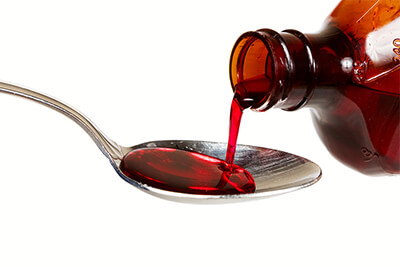DXM Addiction: Effects, Symptoms, and Rehab Treatment

Dextromethorphan, commonly referred to as DXM, is a cough suppressant found in more than 120 over-the-counter cold medications.1,2 Typically in extra-strength cough syrups, tablets, and gel capsules, DXM is either the primary ingredient or mixed in combination with other medications like antihistamines, analgesics, expectorants, and decongestants.3
When misused in high doses, DXM can cause euphoria and auditory and visual hallucinations.2
This page discusses DXM, how it affects the brain and body, the warning signs of misuse, and treatment options for DXM addiction.
What is DXM?
In 2018, 13.4 million products containing DXM were sold in the United States.2 When taken as directed, DXM can be a helpful anti-coughing antidote.4 However, at high doses, DXM can produce effects similar to marijuana, ketamine, or PCP intoxication, including euphoria and visual and auditory hallucinations.4 Unlike marijuana, ketamine, and PCP though, DXM is not a controlled substance or a regulated chemical under the Controlled Substances Act.4
DXM Side Effects and Dangers of Use
DXM, also referred to as CCC, dex, poor man’s PCP, robo, rojo, Skittles, triple C, and velvet, is usually taken orally in gel capsules, tablets, or in cough syrup.4 However, it can also be sold and misused as a powder that is mixed with water and injected or mixed with soda and ingested orally, a method of misuse known as “robotripping” or “skittling.”3 This form of consumption, as well as DXM’s widespread availability and inexpensive cost, may make it appealing to adolescents.
The National Institute on Drug Abuse’s Monitoring the Future survey started measuring non-medical use of cough and cold medicines among 8th, 10th, and 12th graders in 2006. Since then, use among 10th and 12th graders has shown a steady decline. In 2021, 1.7% of 12th graders and 2.7% of 10th graders reported using an over-the-counter cough or cold medicine recreationally in the previous 12 months. On the other hand, 8th-grade use declined steadily for 8 years but rose sharply in 2020 with 4.6% of 8th-grade respondents reporting non-medical use of an OTC cough or cold medicine that year. In 2021, however, that number decreased to 3.5% of 8th-grade respondents using an OTC cough or cold medicine in the past year.5
High-dose use of DXM, in combination with other drugs and alcohol, is dangerous, especially when combined with selective serotonin reuptake inhibitors (SSRI) antidepressants. The drug interaction increases the risk of a life-threatening serotonin syndrome.2,4
Additionally, misuse of DXM in medications containing other active ingredients can cause health complications, including high blood pressure (from pseudoephedrine), liver damage (from acetaminophen), central nervous system toxicity, and heart damage (from antihistamines).4
Signs of DXM Misuse
DXM Addiction
Addiction, a treatable chronic disease, is characterized by the uncontrollable use of a substance despite its harmful, negative effects.6 Chronic misuse of DXM may not lead to addiction in everyone, but it does increase an individual’s risk of developing a substance use disorder, the diagnostic term for addiction. Only a healthcare professional can diagnose a substance use disorder using the Diagnostic and Statistical Manual of Mental Health Disorders, 5th edition. Some of the criteria they use to make a substance use disorder diagnosis includes:7
Treatment for DXM Addiction and Abuse
If you or a loved one are misusing DXM, it is not too late to stop. It is important to seek care from a medical professional since overdose and death from DXM use—though rare—have been reported.4 Talk to your doctor about your substance use. They may refer you to a care team that includes medical, mental health, and pharmaceutical providers.
As previously mentioned, addiction is a treatable but complex disease that typically requires a variety of interventions to help you stop using DXM and learn to live a healthy substance-free life.8 There is no single treatment plan that’s right for every individual. Instead, you need a treatment protocol tailored to your specific needs to ensure long-term success.8
Effective treatment addresses not only your substance use but also your physical, psychological, and emotional health, interpersonal relationships, and vocational and legal issues. Treatment may occur in an inpatient, residential, or outpatient setting, depending on several factors that you will discuss with your healthcare provider, including your strengths, assets, resources, support system, needs, obstacles, and vulnerabilities.9
Treatment for a DXM-related substance use disorder may be at least partially covered by most insurance plans. Under the Affordable Care Act (ACA), insurance companies are required to cover at least a portion of all mental health and substance use treatment.10 There may also be assistance available for people who are uninsured or underinsured through state-funded programs that receive Medicaid funding.
If you are seeking help to stop misusing DXM, contact one of American Addiction Centers’ Admissions Navigators to get a free, private phone consultation today at .
They can help you verify your insurance, discuss your unique needs, and find the treatment option that is right for you.

